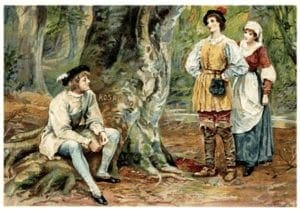Big Government vs. Self-Government in Shakespeare’s As You Like It
This article was featured in our weekly newsletter, the Liberator Online. To receive it in your inbox, sign up here.
William Shakespeare’s comedy As You Like It is known for the themes of marriage, forgiveness and love. However, upon closer examination, it can also be read as a tale of people fighting the wrongs of Big Government, while pursuing self-government.
 First, we have to look at what it means to “self-govern.” We give this our own meaning every day when we make decisions independent from the government. Self-Governing means that you decide how to live and are responsible for your own actions and choices.
First, we have to look at what it means to “self-govern.” We give this our own meaning every day when we make decisions independent from the government. Self-Governing means that you decide how to live and are responsible for your own actions and choices.
In As You Like It, there are two opposing sides in a warring family, Duke Senior, who represents self-government and peace, and the other being Duke Frederick who represents Big Government and violence.
The major motif within the play is a family divided. Duke Senior has been usurped by his brother and banished from the kingdom, while Duke Frederick remains and banishes other members of Duke Senior’s family.
Duke Senior flees to The Forest of Arden where he lives a very minimalist life, among the shepherds who live very pastoral lives. The forest serves as a place of freedom and refuge from the evils of courtly life. The idea of the forest in literature, and especially in this play, is that it is the antithesis of civilization. The forest is the one place that man has not yet touched and made corrupt.
Living in the forest, Duke Senior builds a life for himself, finds other lords who have also left the court, and pursues a freedom in the forest. They operate completely separately from the Big Government that is back at the court, and they are happy.
As we are well aware, Big Government always tries to intervene. Rare contributor Bonnie Kristian wrote an interesting article about how even the smallest examples of government interference should concern us.
Even during Shakespeare’s time, there is government overreach. Duke Frederick and his posse go after Duke Senior. However, along the way he meets a priest who convinces him to lead a peace-loving life away from the court. Self-government, for the win!
If self-government worked in the Shakespearean era, with practice, it can work today, several hundred years later.
Most importantly, are you putting self-government into practice in your daily life?

























